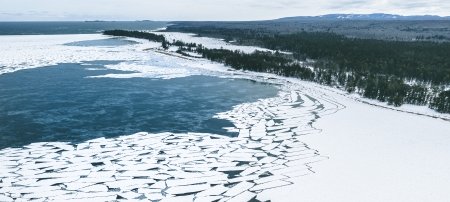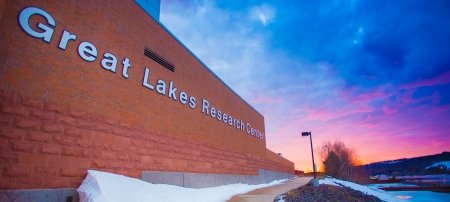New Michigan Sea Grant Extension educator Lauren Jescovitch has a new home base at Michigan Tech’s Great Lakes Research Center in Houghton.
Michigan Technological University and Michigan State University Extension announced the joint collaboration, which is designed to enhance fisheries and aquaculture outreach and education in the Upper Peninsula.
Jescovitch, who started her new position Oct. 28, wants to help connect Michigan Tech and MSU/Sea Grant resources with UP communities and residents. “I enjoy working with people and communities to help them find practical solutions in day-to-day obstacles,” she said. “And I love being in the field!”

In addition to her Great Lakes Research Center (GLRC) office, she also works out of the local Extension Service office at Houghton County Arena in Hancock.
“I’m pleased to have Dr. Jescovitch and Michigan Sea Grant/MSU Extension partner with Michigan Tech at the Center,” said GLRC Director Andrew Barnard. “I envision this partnership enabling broad and deep community outreach for Michigan Tech researchers throughout Michigan and surrounding states. Dr. Jescovitch’s expertise in aquaculture and fisheries will also be a valuable addition to Michigan Tech and the Keweenaw, and I look forward to a growing research and outreach partnership.”
Michigan Sea Grant helps foster economic growth and protect Michigan’s coastal Great Lakes resources through education, research and outreach. Michigan Sea Grant is part of the NOAA National Sea Grant network of 34 university-based programs.
Work as an aquaculture Extension educator seems tailor-made for Jescovitch, who earned bachelor of science degrees in fisheries biology and environmental science at Mansfield University of Pennsylvania and a master’s in fisheries and allied aquacultures from Auburn University in Alabama.
“I love learning, and I love to fish, so I put the two together,” Jescovitch said. “In high school, I knew I wanted to go to college and I told my folks I wanted to get a fisheries biology degree. They didn’t think one really existed — so I had to prove it to them.” She also earned a graduate certificate in college/university teaching while completing her PhD in Fisheries and Allied Aquacultures at Auburn.
“We’re very pleased to have this opportunity to work directly with Michigan Tech on this endeavor,” said MSU Extension Director Jeff Dwyer. “Dr. Jescovitch brings a great amount of fisheries and aquaculture knowledge, experience and enthusiasm, which will help both MSU and MTU continue to provide needed services and assistance to industry and tribal partners.”
Jim Thannum, Director of Planning and Development for the Great Lakes Indian Fish and Wildlife Commission, said he appreciates the new position’s focus on aquaculture and fisheries. “We’ve been fortunate in the UP to have had the services of Extension educator Dr. Ron Kinnunen for many years until his recent retirement,” he said. “Dr. Kinnunen built strong partnerships between the commercial fishing industry and state, federal and tribal natural agencies in an effort to ensure the Great Lakes fisheries could continue to sustain jobs and maintain a cherished way of life. It is good to know that the Seafood HACCP courses he taught will continue to be provided through Dr. Jescovitch.”
Michigan Technological University is an R1 public research university founded in 1885 in Houghton, and is home to nearly 7,500 students from more than 60 countries around the world. Consistently ranked among the best universities in the country for return on investment, Michigan's flagship technological university offers more than 185 undergraduate and graduate degree programs in science and technology, engineering, computing, forestry, business, health professions, humanities, mathematics, social sciences, and the arts. The rural campus is situated just miles from Lake Superior in Michigan's Upper Peninsula, offering year-round opportunities for outdoor adventure.






Comments